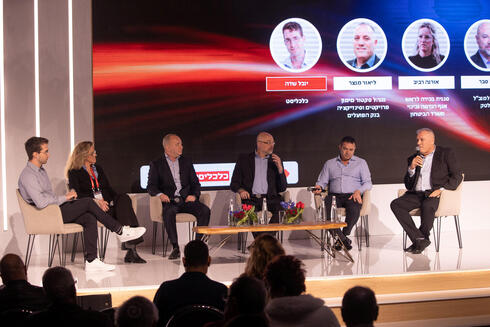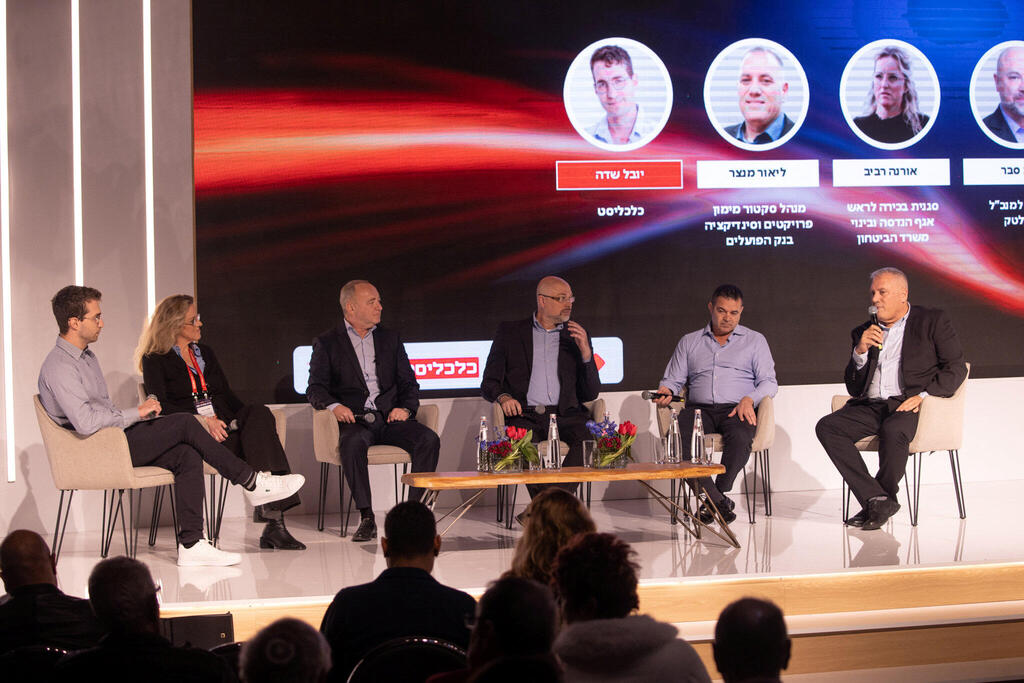
"An electricity shortage isn’t just possible but likely, and without electricity Israel’s high-tech engine will grind to a halt"
Niv Sever, Executive VP of Edeltech Group, spoke at Calcalist’s 2025 Forecasts Conference alongside executives from Mekorot, Bank Hapoalim, the Ministry of Defense, and the Ashdod Port about the challenges facing Israeli infrastructure.
Although the term "infrastructure" often feels synonymous with stability, the past year has proven this need not be the case. War, labor shortages, import challenges, fleeing foreign companies, and controversial regulations have all dealt blows to Israel's infrastructure. An infrastructure panel was held at Calcalist’s 2025 Forecasts Conference in collaboration with Bank Hapoalim and the Phoenix Group moderated by Calcalist’s Yuval Sade, and included Shaul Schneider, Chairman of the Ashdod Port; Amit Lang, CEO of Mekorot; Niv Sever, Executive VP of Edeltech Group; Lior Mentser, head of project finance and infrastructure at Bank Hapoalim; and Orna Raviv, Deputy Head of the engineering and construction department in the Ministry of Defense.
What challenges has the war posed for financing infrastructure projects?
Mentser: "There are numerous challenges. First, I’ll say that Bank Hapoalim has been leading infrastructure for 30 years. Private financing is vastly different from public financing. Before the war, we had reached financial closure on the Green Line. By October, everything was ready for closure. After October 7, we received calls from 5-6 foreign banks saying they would no longer participate in financing. Today, it’s beyond that. Because of the war and Israel’s geopolitical situation, suppliers and contractors are avoiding coming here and international companies are imposing restrictions on their employees."
Regarding infrastructure challenges in war, it seems to me that you are the body that had to deal with the most complex cases - in the Gaza Envelope immediately after October 7th and establishing infrastructure in enemy territory. Can you tell me a little bit about this work?
Raviv: "We have a significant and highly capable operational force. When traumas like October 7 occur, we mobilize for Israeli society. Our activities were based on a NIS 40 billion ($10.9 billion) budget, which is injected back into the economy. Being so interconnected allows us to leverage all our capabilities for recovery and trauma response. We reorganized and stayed close to combat forces and their needs."
Although the war isn’t entirely over, we had electricity and water throughout this period despite worst-case scenarios. Were the fears exaggerated, or were we just lucky?
Lang: "It’s always good to prepare for the worst. It’s in Mekorot’s DNA to prepare for extreme crises, including climate crises. This allowed us to maintain a steady water supply. Credit also goes to Mekorot’s employees, who addressed malfunctions during the war. Additionally, new technologies enabled us to handle some cases remotely."
Many have predicted a sharp rise in demand for electricity, perhaps outpacing supply. Could we face an electricity shortage?
Sever: "Not only is it possible, it’s also likely. Electricity consumption grows by 3% annually. We hope the economy will recover after the war, which would mean additional consumption. Electric vehicles and AI also drive demand. Without electricity, Israel’s high-tech engine would grind to a halt. In the coming years, demand could rise by 10-15%. In such a scenario, the failure of one or two major power hubs could lead to blackouts."
On top of the war, recent months have brought back COVID-like port congestion. As part of the government’s solution, Ashdod Port is supposed to receive assets like a grain silo and an additional dock. Why give these assets to a state-owned company often criticized for inefficiency?
Schneider: "The total capacity of Israeli ports is 6 million TEU, while the country consumes only 3.5 million. Ashdod Port, as a state-owned port, serves the country in emergencies, providing services to the navy and other forces. Therefore, there is no such thing as port congestion - there’s excess capacity. The only waits are for general cargo. For instance, grain ships don’t wait - delays occur when importers fail to secure enough trucks to transport goods from the port. Compare the Ashdod area, with two ports, to Haifa, where most ships wait. Operational queues are determined by the regulator managing the queue."
The defense sector isn’t always seen as a paragon of economic efficiency. Tens of billions will be added to the defense budget in the coming years, with substantial infrastructure investments. Will this improve efficiency and generate revenue?
Raviv: "Our division is equivalent to a mid-sized government ministry in terms of activity and is evaluated annually for efficiency. We must demonstrate savings and efficiency every year. We achieve this by creating jobs and contracting suppliers. Our projects drive the economy and attract suppliers because of our high payment standards."
Speaking of the state and efficiency - in recent months you have been promoting an IPO of the Ashdod Port. Why pursue an IPO instead of privatization, which is one of the principles of this government? Wouldn’t privatization lead to greater efficiency?
Schneider: "I disagree. October 7 taught us the need for a state-owned port. Secondly, there are five private ports, yet Ashdod Port retains its market share, including a significant portion of vehicle and goods imports. The private IPO aims to advance the port’s infrastructure."
Everything is getting more expensive. Water too. While you don’t control the rate, the investments you make today will affect future price and supply. Investment in water infrastructure affects future costs and supply. Are you able to invest enough?
Lang: "Mekorot accounts for only 20% of Israel’s water tariff. The war slowed us down. We aimed for NIS 1.5 billion ($410 million) in investment but only reached NIS 1.3 billion ($356 million) this year. Mekorot is financially strong and arguably the best company in its field globally. I predict that this year we’ll reach NIS 1.5 billion and, in the coming years, NIS 2 billion ($547 million)."
Moving to electricity tariffs, the energy market often criticizes regulatory decisions. Do recent steps, like the tariff hearing, strengthen the Israeli industry?
Sever: "The opposite. Regulators are making moves that require the opposite approach. This sector demands stability, security, and long-term thinking. Instead, regulation doesn’t promote an advanced market, but an infantile one. For example, we hold minority shares in Dorad, slated for expansion. But under the current regulation, which hampers producer efficiency, we won’t expand. As a result, projects like Dorad 2 won’t be built in the coming years."
You represent a bank but are also a major player in energy and infrastructure. Does the state have a coherent strategy?
Mentser: "Of course. The state understands what it’s doing. On the other hand, things are sometimes done without long-term planning and thinking. We saw this in the price cap hearing. I agree, we've seen some sort of breakout, but the pendulum has swung too far in one direction. The larger the backlog of projects, the more foreign investors will enter the market. We saw with the CAF company, for example, that the company suffers from a lot of criticism in Madrid."
What should Israel do to ensure functional infrastructure in 10-20 years?
Mentser: "The state lags behind the OECD. More needs to be done."
Lang: "Improve planning processes."
Sever: "Infrastructure depends on stability."
Schneider: "Faster decision-making."
Raviv: "Fewer barriers."















